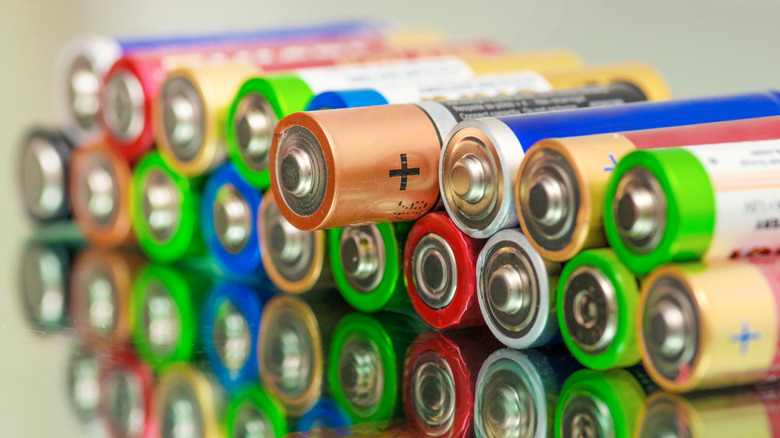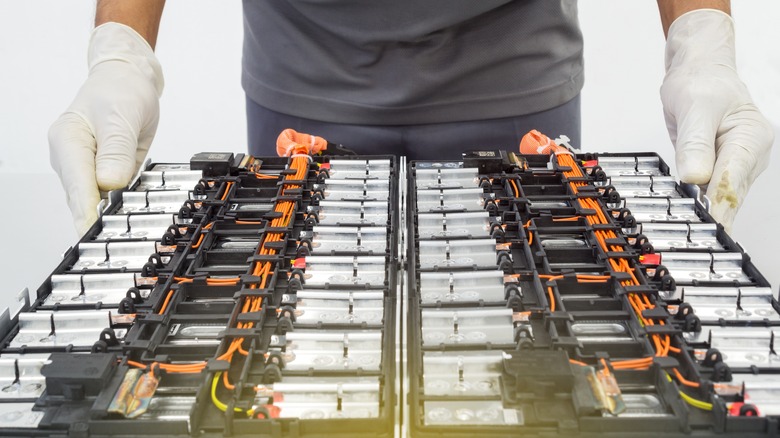Which Battery Type Is Best For An Electric Car?
Elon Musk's Tesla popularized electric vehicles and brought them to the front of the automotive industry. However, cars powered by electricity had been experimented with long before, even before General Motors' EV1. The 19th century marked the inception of vehicles equipped with batteries and electric motors. But as soon as inventors had a breakthrough, only more issues arose, and electric powerplants dropped by the wayside making way for the more viable internal combustion engines.
Understanding the potential benefits, inventors and automakers alike didn't give up on electric-powered vehicles completely. During the '90s there were a few cars showing promise, but they all utilized the lead-acid batteries commonly found in gasoline vehicles to start the engine. Due to their inefficiency, vulnerability to cold temperatures, and lack of durability, they were impossible to make work, so automakers once again put the concept of electric vehicles on the back burner.
With the advancements in modern technology, car manufacturers were able to develop various types of electric powerplants as alternatives to lead-acid batteries, and they don't seem to be taking a break, as the electric vehicle part of the automotive industry rapidly grows.
Types of batteries in electric vehicles
Nickel-metal-hydride batteries made a short appearance on the market after lead-acid batteries were ruled out as the solution. Because of development and manufacturing costs, as well as their lack of efficiency at high temperatures and short operating distances, they were quickly phased out too. Nickel-metal-hydride batteries are better at fulfilling a supporting role in hybrid cars rather than being the main power plant in electric vehicles. The only advantage of these types of batteries is their durability.
Lithium-sulfur batteries show promise as a better alternative to lithium-ion batteries. The reason why they aren't mass-produced as of yet is their short lifespan. Horizon states, "The main problem is that current lithium-sulphur (Li-S) batteries cannot be recharged enough times before they fail to make them commercially viable". However, if a solution can be found, they may quickly replace lithium-ion batteries due to cheaper production costs, more range, and lesser environmental impact.
Solid-state batteries are another alternative to look out for currently in development. Toyota claims to be leading the charge, saying, "We are on track for limited production by 2025". Solid-state batteries should, on paper, come with none of the disadvantages that current lithium-ion-powered cars have. They'll be lighter, denser, higher-performing, and have a longer driving range. However, until they officially hit the market, there's one battery type that's best for an electric vehicle.
The best battery type for electric vehicles
Lithium-ion batteries are currently used in most portable electronic units because of their high energy in a relatively condensed mass as well as energy efficiency compared to most other batteries. Although the exact chemistry slightly varies between manufacturers, most modern electric and plug-in hybrid vehicles today are powered by lithium-ion battery packs. On the surface, lithium-ion batteries don't have many disadvantages, especially compared to other energy storage unit types. Besides good energy-to-weight ratio and energy efficiency, they're less susceptible to high or low temperatures, they're slow to discharge, and most components can be recycled. What's not to like?
As an example, Kia's EV6 promises up to 316 miles of range, with a 10-year/100,000-mile battery warranty. Although a 10-year warranty sounds great on paper, we need to consider the fact that there are plenty of internal combustion engines (ICE) running perfectly fine even after 30 years of use and abuse. Lithium-ion batteries' relatively short lifespan, as well as overall high costs and slight overheating concerns, are still being researched and worked on by manufacturers. Even still, there's debate about whether lithium-ion batteries are overall better for the environment, and determining when an EV becomes greener than a gas car is trickier than it first seems.


